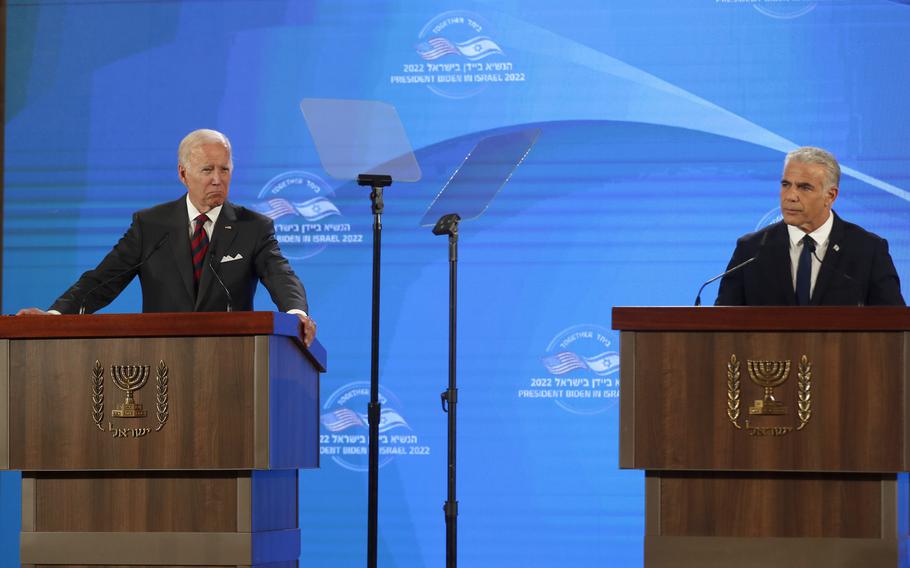
U.S. President Joe Biden, left, gives a press conference with Israel’s Prime Minister Yair Lapid, at the Waldorf Astoria Hotel in Jerusalem, Thursday, July 14, 2022. (Atef Safadi/Pool via AP)
President Joe Biden’s trip to Israel and Saudi Arabia highlights the stark contrasts between two very different, very important nations in the Mideast. The former, our closest ally in the region, is a democracy with tremendous assets.
The latter is a fragile entity, entirely dependent on one asset — petroleum. Biden was effective in referencing the grotesque murder of dissident Jamal Khashoggi, without publicly insulting the Saudi government. The radical regime in Iran reinforces United States ties for both nations.
Regional instability, reinforced by terrorist groups, plus U.S. self-interest makes the Mideast especially challenging.
The 1956 Suez Crisis remains particularly important. President Dwight Eisenhower used leverage to end a secretly planned old-style colonial military invasion by Britain, France and Israel to recapture the Suez Canal, nationalized by Egypt’s new military regime, and seize the Sinai Peninsula.
Ike’s instincts were on target, as usual, and our alliance relationships survived. In Britain, Harold Macmillan succeeded Victorian Prime Minister Anthony Eden, who belatedly acknowledged that the U.S. is the principal diplomatic and strategic leader, source of weapons as well as positive foreign aid, and other capabilities, in the Mideast and around the world.
Approximately two years after Suez brought strategic disaster for the three invading nations, Eisenhower decided U.S. forces should intervene directly in Lebanon with a sizable military force. Given the volatile nature of the region, the intervention was risky.
American troops suffered only one soldier killed by hostile fire. Our forces were concentrated in Beirut’s city center, the port and the airport. The crisis did not escalate, and Eisenhower withdrew our forces. In Washington, opposition to the operation was largely partisan in nature.
Disciplined decision-making by Eisenhower contrasts sharply with the undisciplined, arrogant manner in which the George W. Bush administration in 2003 invaded and structurally destroyed Iraq. Our forces went to Lebanon in 1958 to occupy specific, potentially vulnerable areas, on a mission strictly limited in time as well as space.
In 1973, disciplined hard work of the Nixon administration was crucial to Israel’s successful defense against a combined attack by Arab states. Secretary of State Henry Kissinger led follow-up efforts to ease tensions in the region.
This led to major peace agreements. President Jimmy Carter’s own determination and discipline achieved the historic 1978 Camp David peace agreement between Egypt and Israel.
In 1990-91, President George H.W. Bush and associates orchestrated an enormous international effort to drive invading Iraq forces from Kuwait. Immediately thereafter, the U.S. pursued efforts for peace between Israel and the Palestinians.
Secretary of State James Baker demonstrated extraordinary energy and dedication in sustained diplomacy that followed. The Madrid conference at the end of October 1991 led to the Oslo accords between Israel and the Palestinians. This in turn facilitated the peace treaty between Israel and Jordan in 1994.
U.S. military involvement in the Middle East in recent years has tended to be less substantial. The U.S. has spearheaded the sustained international effort that successfully defeated and largely destroyed the radical fundamentalist Islamic State movement. The Obama administration engaged in limited efforts to assist armed opponents of the Bashar Assad regime in Syria.
Today, scholars rightly respect Eisenhower, always revered by average Americans. The rarely discussed Lebanon intervention deserves review any time our forces may become directly engaged in the explosive, unpredictable Middle East.
After the Suez crisis, the Soviet Union cemented ties with Arab states. This ended with the end of the Cold War; President George H.W. Bush cemented American leadership.
Today Iran, Russia and Turkey expand Mideast influence. The first is hostile to stability; the second, our principal enemy during the Cold War; the last, our formal ally but antagonistic.
The Trump administration deserves credit for brokering recognition between Israel and the United Arab Emirates, plus Bahrain. The Biden administration can build on this.
Arthur I. Cyr is author of “After the Cold War.”